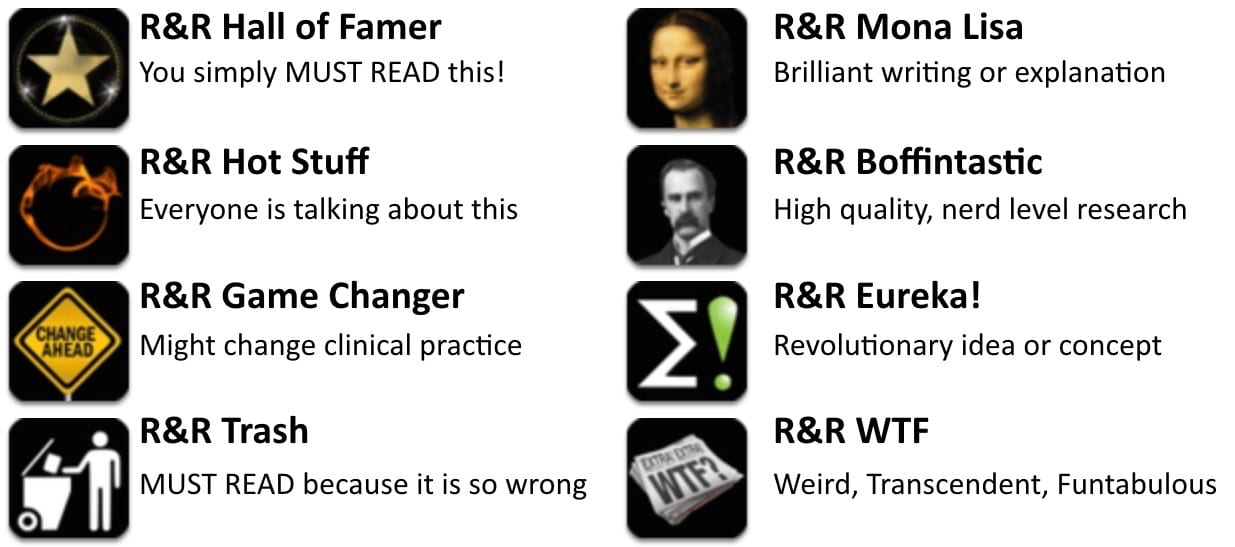R&R In The FASTLANE 125
Welcome to the 125th edition of Research and Reviews in the Fastlane. R&R in the Fastlane is a free resource that harnesses the power of social media to allow some of the best and brightest emergency medicine and critical care clinicians from all over the world tell us what they think is worth reading from the published literature.
This edition contains 6 recommended reads. The R&R Editorial Team includes Jeremy Fried, Nudrat Rashid, Soren Rudolph, Anand Swaminathan and, of course, Chris Nickson. Find more R&R in the Fastlane reviews in the : Overview; Archives and Contributors
This Edition’s R&R Hall of Famer
Bellolio MF et al. Incidence of Adverse Events in Adults
Undergoing Procedural Sedation in the Emergency Department: A Systematic Review and Meta-analysis. Acad Emerg Med 2016. PMID: 26801209
- What exactly are the risks of procedural sedation? I know them qualitatively, but when having an informed choice conversation, are you able to quote the actual incidence? I know I couldn’t. This is a systematic review and meta-analysis to determine the incidence of adverse events in ED procedural sedation (limited to after 2004). They found 55 articles that covered 9652 procedural sedations. The most common adverse events: hypoxia (40/1000 but only 23/1000 were <90%), vomiting (16/1000), hypotension (15/1000), and apnea (12/1000). The serious adverse events: laryngospasm (4/1000), intubation (1.6/1000), aspiration (1.2/1000). If you are interested, they do break some of these number down based on what agent was used. There was a fair amount of heterogeneity in definitions in the original studies. Also pediatrics was excluded. Bottom line: Procedural sedation is safe, but we should have a sense of these numbers for adverse events.
- Recommended by Justin Morgenstern
LeBlanc VR. The effects of acute stress on performance: implications for health professions education. Academic medicine 2009. PMID: 19907380
- How well do we perform under extreme stress? This is an excellent overview of our responses to stress, the various ways it can both impair and enhance performance, and a few strategies to help.
- Recommended by: Justin Morgenstern
ZPatel MR, et al; ROCKET AF Executive Committee and Investigators. Point-of-Care Warfarin Monitoring in the ROCKET AF Trial. N Engl J Med 2016. PMID: 26839968
- Not the usual primary literature we recommend here on R&R, but an issue of which we all should be aware.The point of care device used during the ROCKET-AF trial, which demonstrated the non-inferiority of rivaroxaban in comparison to warfarin, has been shown to be faulty. Specifically, it provided falsely low INR measurements, which may have led to higher doses of warfarin, thus increasing the hemorrhage risk of those patients within the study, falsely demonstrating an equivalent safety profile. In this letter to NEJM, the authors of the original study re-examine the evidence and state that rivaroxaban continues to be just as safe as warfarin. Meanwhile, the BMJ and others have called for an independent review of the data.
- Read More: Rivaroxaban: Can we trust the evidence?
- Recommended by Jeremy Fried
Mehta AJ. Alcoholism and critical illness: A review. World J Crit Care Med 2016. PMID: 26855891
- Alcohol is the most widely used drug in the world and is a substantial burden to both society in general and the healthcare system. According to the WHO globally, harmful use of alcohol causes approximately 3.3 million deaths every year (or 5.9% of all deaths), and 5.1% of the global burden of disease is attributable to alcohol consumption.
- This review examines the effects of alcohol overconsumption associated with critical illness and severe injury. Compared with patients without alcohol overuse, has critically ill patients with alcohol overuse complex illness with greater complications, longer hospital both ICU and hospital stay, a larger resource consumption and increased mortality.
- Several of these facts are known, but I found these findings especially interesting:
- Patients with chronic alcohol overuse in addition to having an increased risk of pneumonia also have an increased the risk of developing pneumonia with particularly virulent pathogens (eg. Pseudomonas and acinetobactor)
- Chronic alcohol overuse leads to changes in the patient’s immune system, leaving them functionally immunodeficiency with an increased risk of severe sepsis, septic shock, ALI and ARDS.
- Alcohol consumption increases the risk of injury, but being drunk at the time of injury is not uniquely associated with poorer outcome.
- Recommended by Søren Rudolph
Stollman N, et al. American Gastroenterological Association Institute Guideline on the Management of Acute Diverticulitis. Gastroenterology 2015. PMID: 26453777
- The American Gastroenterology Association just released practice guidelines on diverticulitis. Anyone following recent trends in the uncomplicated diverticulitis literature knows people have been studying antibiotics vs supportive care/close observation for years, with no significant benefit to antibiotics. In keeping with this, the AGA suggests that “antibiotics should be used selectively, rather than routinely, in patients with uncomplicated disease.” Oh, and they also urge us not to tell our patients to avoid seeds, popcorn, and nuts. (Note: alot of these recommendations are based on low quality evidence).
- Recommended by Lauren Westafer
Macias M et al. The electrocardiogramin the ACS patient: high-risk electrocardiographic presentations lacking anatomically oriented ST-segment elevation. Am J Emerg Med 2015. PMID: 26742458
- This review focuses on the 5 of the more common, yet lesser known, high-risk ECG patterns in the ACS patient that you gotta know:
- 1st Diagonal Branch of LAD Artery
- de Winter Presentation
- Left Main Coronary Artery Occlusion
- Wellens Syndrome
- Posterior Wall MI
- Recommended by Salim R. Rezaie
Emergency physician with interest in education and knowledge translation. #FOAMed Fan | @jdfried |






